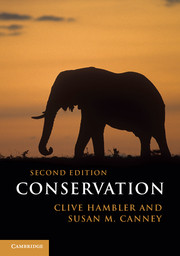Book contents
- Frontmatter
- Contents
- Preface to the Second Edition
- 1 Introduction to conservation
- 2 Threats to biodiversity
- 3 Evaluation of priorities for species and habitats
- 4 Monitoring and Environmental Impact Assessment
- 5 Management of natural and fragmented habitats
- 6 Management of species
- 7 Sustainable use, semi-natural cultural landscapes and the matrix
- 8 Restoration and offsetting
- 9 Environmental policy
- References
- Index to species names
- Index
- Plate section
9 - Environmental policy
Published online by Cambridge University Press: 05 February 2013
- Frontmatter
- Contents
- Preface to the Second Edition
- 1 Introduction to conservation
- 2 Threats to biodiversity
- 3 Evaluation of priorities for species and habitats
- 4 Monitoring and Environmental Impact Assessment
- 5 Management of natural and fragmented habitats
- 6 Management of species
- 7 Sustainable use, semi-natural cultural landscapes and the matrix
- 8 Restoration and offsetting
- 9 Environmental policy
- References
- Index to species names
- Index
- Plate section
Summary
Social components of conservation and the human–nature relationship
Previous chapters have discussed ways of identifying sites that best ensure the widest possible number of habitats and species persist through time. Such conservation science provides a solid scientific basis for action, raising awareness and informing policy. However, because the practice of conservation requires managing human behaviour, the social sciences are vital to understand and engage with the wider socio-ecological system. This advance in conservation provides the important bridge between academic disciplines, and between science and practice, and leads to more efficient conservation.
Improving our understanding of the human–nature relationship (both as individuals and as societies) helps identify the ultimate causes and incentives leading to the conservation problem, and therefore guides a more effective strategy for its resolution. It also provides methods that increase the effectiveness of projects, through engagement with local stakeholders as well as with the institutions and power structures of society. This chapter aims to provide a flavour of how these perspectives inter-relate, while the case study provides a real-world example (Section 9.9).
Surveys of the general public around the world show a generally high level of concern about environmental issues and support for environmental protection (Leiserowitz et al., 2005). Yet these attitudes have not been translated into results. The destruction of nature is the result of the lifestyles of billions of humans, rarely acting through malicious intent, but driven by a set of policies that encourage destructive and unsustainable lifestyles. To change behaviour we need to understand people, their attitudes, values and why they make the choices they make (Balmford & Cowling, 2006; Teel & Manfredo, 2009; Schultz, 2011).We also need to understand societies, their structures and the impact these have on individual behaviour.
- Type
- Chapter
- Information
- Conservation , pp. 309 - 348Publisher: Cambridge University PressPrint publication year: 2013



